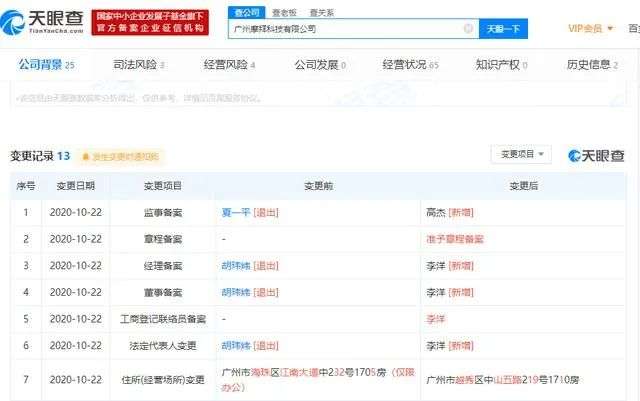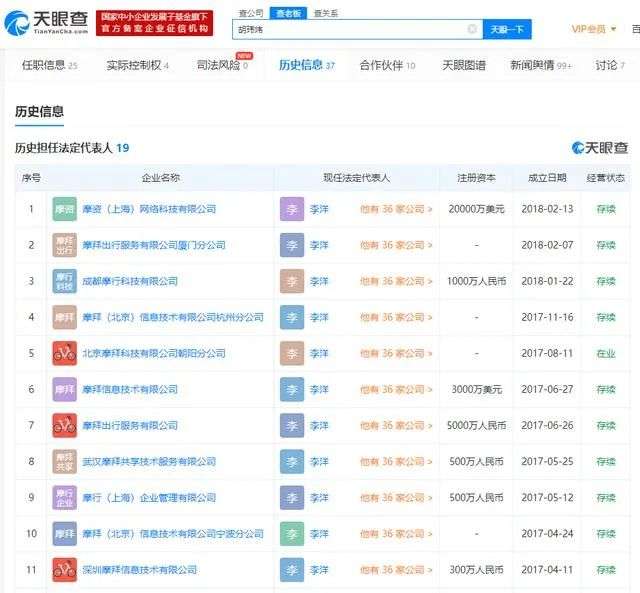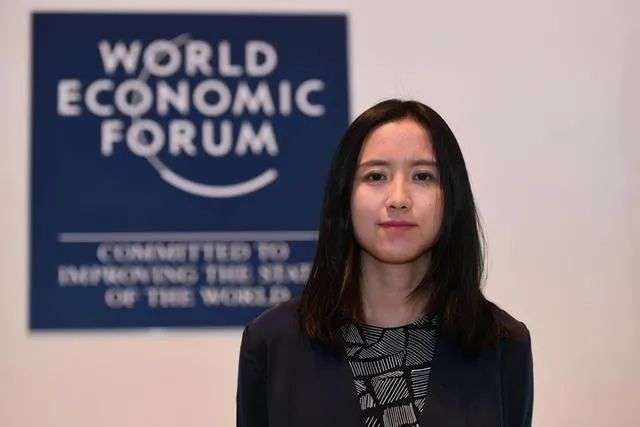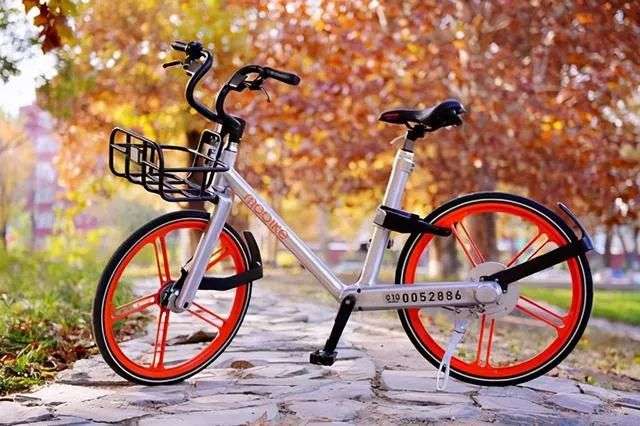The road to wealth for media people born in the 1980s…
Editor’s note: This article is from the WeChat public account “Radar Finance” (ID: leidacj) , author: Zhang Kai Jing Shu editor: deep sea.
After founding Mobike, Hu Weiwei has swept 12 rounds in less than three years, with a total of more than 2 billion US dollars in financing. After being acquired by Meituan in 2018, Hu Weiwei made a profit of 1.5 billion yuan based on his 9% shareholding ratio at that time. Since then, the layout of the shared bicycle field has gradually developed from a double-powered competition to a three-legged stand of Qingju, Hello, and Meituan, while Hu Weiwei is stepping out of the Mobike system.
Hu Weiwei, the founder of Mobike, once again reported that he was resigning.
Sky Eye Check shows that on October 22, Guangzhou Mobike Technology Co., Ltd. (hereinafter referred to as “Guangzhou Mobike”) has undergone many industrial and commercial changes, and the legal representative, director and manager of the company have changed from Hu Weiwei to Li Yang. Radar Finance found that this is the seventeenth Mobike company that Hu Weiwei withdrew.
Up to now, Hu Weiwei’s employment in the Mobike department includes: Mobil Travel Technology Co., Ltd. and Shanghai Motorcycle Technology Co., Ltd. acted as legal representatives, and worked in Shanghai Motorcycle Technology Co., Ltd., Beijing Jiche Technology Co., Ltd. serves as a shareholder and serves as an executive in several companies.
In 2015, 33-year-old Hu Weiwei, with the help of Li Bin, the founder of Bitauto.com and the current chairman of Weilai Auto, established the main operating body of Mobike-Beijing Mobike Technology Co., Ltd. (hereinafter referred to as “Beijing Mobike”), and swept 12 rounds in less than three years, accumulating more than 2 billion US dollars in financing.
In 2018, Mobike, which continued to lose money and had high debts, was acquired by Meituan. Based on Hu Weiwei’s original 9% shareholding ratio, it is estimated that after selling Mobike, individuals will cash out 1.5 billion yuan.
Radar Finance noticed that after the acquisition of Mobike, the number of Mobike bicycles on the street has gradually decreased. “Meituan Bicycle “Flooded the streets and alleys. The pattern of shared bicycles has evolved from the dual power struggle of Mobike and ofo to the trio of green orange, Hello, and Meituan.
Hu Weiwei stepped down as Guangzhou Mobike and has withdrawn from 17 Mobike affiliates so far
According to Tianyan, Guangzhou Mobike, which Hu Weiwei withdrew this time, was established in December 2016 with a registered capital of RMB 5 million and is wholly-owned by Beijing Mobike. Now the company’s actual controller is Meituan Chairman Wang Xing.
In fact, this is the 17th Mobike-related company that Hu Weiwei has resigned.
After the acquisition of Mobike by Meituan in 2018, Hu Weiwei, Li Bin and Wang Xiaofeng retired from the natural person shareholder status of Beijing Mobike in November of that year. Hu Weiwei also surrendered the executive director, manager and director on July 5, 2019. Wang Huiwen will take over as the legal representative of the company.
In addition, Tianyan Check shows that Hu Weiwei has served as the legal representative of 19 companies in history. Among them, except for the two companies that Hu Weiwei was in before founding Mobike, Beijing Jiche Technology and Beijing Yichen Interactive Technology, the remaining 17 Related to Mobike, but now the legal representative of these 17 companies is Li Yang. Similar to Beijing Mobike, the legal representatives of many of these companies have also undergone Wang Huiwen’s transition.
From June to July 2019, Hu Weiwei successively worked from Wuhan Mobike Sharing Technology Service Co., Ltd., Mobike Information Technology Co., Ltd., Sichuan Mobike Technology Co., Ltd., Shenzhen Mobike Information Technology Co., Ltd., and Mobike Travel Service Co., Ltd. The company, Mobike (Shanghai) Intelligent Technology Co., Ltd., and Mobike (Beijing) Information Technology Co., Ltd. retired.
From the end of 2019 to the beginning of 2020, Hu Weiwei withdrew from the Xiamen branch of Mobike (Shanghai) Network Technology Co., Ltd. and Mobike Travel Service Co., Ltd. in the same way. At present, the only affiliated companies of Mobike where Hu Weiwei is located are Gui’an New District Mobike Travel Technology Co., Ltd., Shanghai Mobike Technology Co., Ltd. and Mobike Travel Service Co., Ltd. Qingdao Branch.
According to public information, Wang Huiwen is the co-founder of Meituan, and Li Yang is Meituan CommentsSenior Vice President, currently holds senior management positions in as many as 34 companies.
Hu Weiwei may cash out 1.5 billion after selling Mobike
As the founder of Mobike, Hu Weiwei has always been interested in the field of travel.
Hu Weiwei was born in Dongyang, Zhejiang in 1982. Later in an interview, she mentioned that she had followed her parents across the country since she was a child, doing a mobile woodcarving business, which also cultivated her pursuit of quality and craftsmanship.
From Zhejiang in 2004After graduating from the Department of Journalism of University City College, Hu Weiwei joined the newly launched “Daily Economic News” as an automobile reporter in the Ministry of Economic Affairs. Since then, he has been in the automobile industry for ten years. In 2013, she participated in the Consumer Electronics Show held in Las Vegas, USA, which inspired her vision for the future of the travel industry.
After returning to China, Hu Weiwei tried to persuade her boss to make a column about cars and technology, but it didn’t take shape. So she resigned and founded Geek Auto, and determined to be the best and most interesting new automotive technology media in China. .
About Mobike’s thoughts when it was founded, Hu Weiwei said in an interview that after many years of working as a media in the automotive industry, he will bring some teams to meet investors. On the one hand, he can learn by himself, and on the other hand, he can learn more People in the industry.
“At that time, I was judging that personal transportation would become a trend in the future, so I took a team to see Li Bin and said that I wanted to be an electric scooter. Later, I was chatting and Li Bin suddenly asked if he ever wanted to be a shared bicycle. , I think this idea particularly touched me. The name of the brand was decided that night, it is the mobile bike Li Bin thought of, and the Chinese name is Mobike.”
At first, Hu Weiwei wanted to join the project as a supporter, but the industrial designers around him thought it was difficult and were unwilling to do it, so she became the founder of the project.
On January 27, 2015, the company was successfully registered. Hu Weiwei took a start-up team of about 10 people and Li Bin invested 1.46 million yuan in start-up capital to start the development of Mobike. The influence of the family makes Shege outside attaches great importance to the design and development of bicycles. According to Hu Weiwei himself, Every part of the first-generation Mobike body has undergone strict consideration.
“I ran many domestic bicycle assembly plants and parts factories at the time. I said that I had a goal, to produce a four-year maintenance-free bicycle, because the initial model was set to ride 5 times a day. Two kilometers at a time, you can ride for 4 years. But after a lap, no one can produce our ideal shared bicycle.” Hu Weiwei once mentioned in a speech.
So the team began their own design of Mobike, including the use of shaft drive instead of chain drive in the drive; the rear wheel has a motor to generate electricity;The aluminum body is back to the original color of the material; the armrest has a single swing arm; the tire is a non-pneumatic tire with five-spoke wheels and hot rubber foam molding inside.
All the designs are to further extend the service life of Mobike. Among them, the all-aluminum body can delay rusting, and the wheel hub is less tolerant than steel wireVariable shape, with five wheels The lifespan can reach 8 years; and the heavy ride is because the motor generates electricity, which requires relatively large kinetic energy to be injected.
In November 2015, the first generation of Mobike came out, and then began a trial in Shanghai. In the early days, Hu Weiwei also faced the problem of high bicycle costs and shortage of funds. However, the frequent injection of financing has solved the problems one by one in a short time.
Data from a third-party platform shows that before being acquired by Meituan, Mobike had experienced 12 rounds of intensive financing from the angel round to the F round, far exceeding US$2 billion. During this period, Hu Weiwei himself also frequently met with the public, shaping Mobike’s feelings and values through continuous speeches, appearances in colleges, and CCTV.
In an interview at the end of 2017, the host asked Hu Weiwei about the future of Mobike. At that time, Hu Weiwei mentioned that the future of Mobike has two main directions: one is that the distance of travel may gradually increase; It is on the basis of connecting destinations and users, other possible impacts on people’s lives.
However, Hu Weiwei did not wait for the day when Mobike further expanded. More than a year after Mobike was acquired by Meituan, Hu Weiwei and former Mobike CEO Liu Yu once again joined forces to establish Shanghai Korui Technology Development Co., Ltd.
However, Shanghai Kaorui Technology Development Co., Ltd. has not yet caused a huge response.
Meituan has acquired Mobike for more than 900 days, and the battle for hegemony between the two powers has evolved into a three-legged battle
Since Hu Weiwei chose to let go of Mobike, the bike-sharing industry has undergone drastic changes.
On April 4, 2018, under the impetus of Tencent, Meituan purchased Mobike for 3.7 billion US dollars, of which 3.7 billion included 1 billion liabilities.
Prior to this, Mobike was valued at US$3.825 billion in the last round, and the US$2.7 billion offer was basically the same as the sum of all financing received by Mobike since its establishment. In addition to selling to Meituan, Mobike can also choose to accept a joint capital injection of approximately US$1 billion from Didi and SoftBank to continue the story of shared bicycles.
However, at that time, Mobike’s daily orders were less than 10 million. With a monthly revenue of 110 million yuan in December 2017, it would cost up to 400 million yuan in operating expenses. While the debt exceeds 1 billion U.S. dollars, it still owes the supplier about 1 billion yuan in payment.
More importantly, ofo, which is competing with Mobike, is also experiencing a big defeat.
At the end of 2017, Didi, who had a disagreement with the company’s founder Dai Wei, evacuated all the team members and established Qingju Bike while constantly digging people from ofo with high salaries.
At the beginning of 2018, a person claiming to be from ofo said that after the company paid the salary in January, the cash on the accounts could only support another month, and the daily order volume fell by about 60% compared with October 2017, and it owed the supplier. 2.5 billion yuan.
When the doubts about shared bicycles became more and more intense, Dai Wei chose to use movable property mortgages for 4 million bicycles in exchange for Ali’s 1.77 billion loan financing.The last fight. Hu Weiwei, together with Li Bin and other co-founders, sold Mobike to Meituan.
At the end of 2018, ofo gradually declined, the company’s address was relocated, and it was extremely difficult to operate. At one time, thousands of small yellow car users “siege” the Beijing headquarters and demanded a deposit refund. It is reported that the number of people returning the deposit has reached more than 11 million, and some users even said that if the refund rate is calculated at less than 10,000 people in a day, it will take 3 years to receive the deposit.
After being acquired, Mobike has also become the “oil bottle” of Meituan. The financial report shows that in 2018, Mobike added about 1.5 billion yuan in profits to Meituan, but at the same time it brought a loss of 4.55 billion yuan.
When the two giants were faltering, Haro bicycles suddenly emerged. With the “no deposit” and “rural encirclement of the city”, Mobike ofo gradually established a network covering more than 100 counties and cities nationwide when Mobike ofo competed for the big city. The internet. Haro Bikes CEO Yang Lei once said that the nationwide deposit-free strategy has brought about a very obvious increase in users and cycling orders, with up to 1.9 million new users in one day.
At the same time, Green Orange Bicycle has also achieved a catch. In January 2018, Didi Chuxing and Xiaolan Bicycle announced that they had reached a bicycle business hosting cooperation, and Xiaolan Bicycle would be hosted by Didi. In the same month, Qingju Bikes went online in Chengdu, and gradually replaced all the acquired small blue bikes with Qingju in the subsequent development.
In January 2019, Wang Huiwen issued an internal letter announcing that the Mobike brand will be renamed Meituan Bikes, and the Meituan App will become its only domestic portal. Soon after, the Meituan “little yellow car” of “Go Mobike” went online. At this point, the new situation of shared bicycles in the “Three Kingdoms Kill” of Haro, Qingju, and Meituan has basically taken shape.
According to the World Wide Web report, as of October 2019, the market share of three shared bicycles, Harrow, Meituan, and Qingju, has reached 95%.
At the end of 2019, shared bicycles entered the “1.5 yuan era”. Some insiders believe that this highlights the profitability of shared bicycles from the side. The price increase has forced users to change their consumption habits from paying deposits to using monthly and annual cards. Membership, but the transition from the deposit to the membership model is not enough to solve the company’s difficulty in profitability.
In this regard, Meituan Wang Xing once stated in December 2019 that the short-term priority of the travel business is to reduce losses and create strategic value, rather than gain market share. And Zhang Zhidong, general manager of Didi’s two-wheeled vehicle business unit, on August 13 this year, Qingju Bicycle Media Open Day, Didi’s current goal for Qingju is to seize more users and market share compared to profitability.
Since 2020, the silent war on shared bicycles has continued, but it is very different from the previous “money burning war”.
In April, Haro Travel’s market share once occupied 70% of the industry. But at the same time, it was also reported that Didi Qingju Bikes had received more than $1 billion in financing.
In May, with the gradual recovery of the epidemic, the contest between subsidies and discounts restarted. The three major companies jointly launched incentives for free cycling in the morning and evening peak hours, and users can enjoy free cycling within half an hour of each single. After several battles, Haro’s original advantages are gradually being eroded.
According to media reports, a Haro related person said, “At the end of the second quarter, Haro’s market share in many of the top cities has shrunk greatly, with the most being more than half.”
It is worth mentioning that, as a new growth point of shared travel, shared electric bicycles are also being continuously increased by the three giants of Didi, Meituan and Haro. Industry insiders believe that the operation of shared bicycles is no longer as simple as riding, but to revolve around riding and linking more life elements related to riding to form an ecosystem that relies on bicycles and ultimately serves users.
Hu Weiwei also envisioned building an ecosystem. Can her unfinished business be completed in the hands of the three giants?




